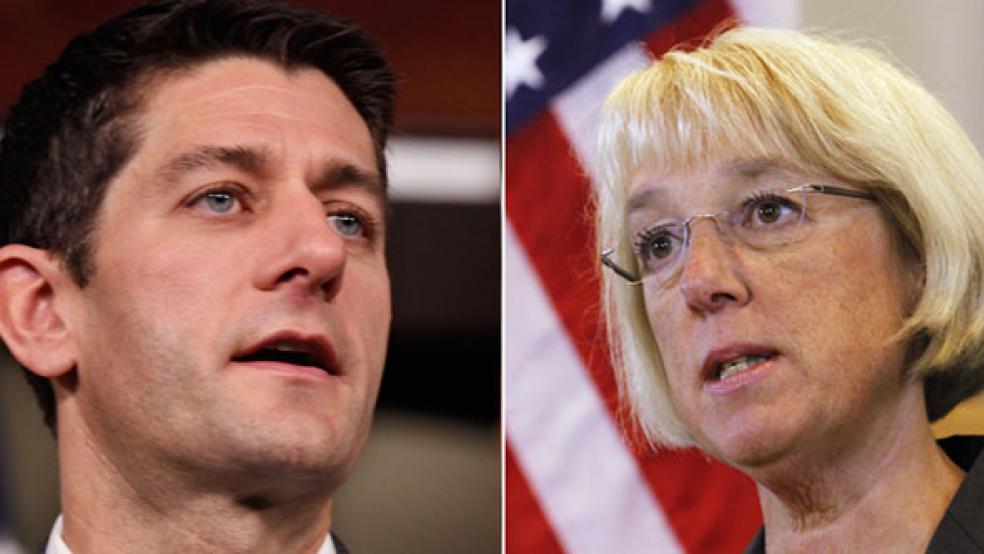Paul Ryan, the Republican congressman from Wisconsin, and Patty Murray, the Democrat from Washington State, are on the budget hot seat as the country closes in on some key fiscal deadlines.

On Thursday the Senate approved the House measure that postpones raising the $16.4 trillion national debt ceiling until May 18. That gives Congress and President Obama some breathing room to draft their respective budgets for the coming fiscal year. But Ryan and Murray will each have to move quickly despite that new deadline.
As the Senate Democrats’ new face for budget policy, Patty Murray holds one big advantage over her Republican counterpart in the House: No one whispers about her presidential chances in 2016.
Unlike House Budget Committee Chairman Paul Ryan, last year’s GOP vice presidential nominee, Murray has the luxury of staking out her turf without the same kinds of political pressures. The 62-year-old can freely call for hundreds of billions of dollars in new tax revenues without sweating the possible blowback in Iowa and New Hampshire.
“Ryan’s hand is a whole lot harder to play, there’s no question about it,” said Robert D. Reischauer, a former director of the Congressional Budget Office and prominent domestic policy expert. “He wants to appear to be a leader for the country. But to even get to the point where that question is relevant, he needs the support of the conservative wing of the Republican Party.”
The differences between the two prominent policy makers couldn’t be starker.
TENACITY FOR ONE, ZEAL FOR ANOTHER
Patty Murray has a tenacity that belies the “mom in tennis shoes” image that first carried her into the Senate in 1992. She moved through the leadership ranks as a devout liberal who survived an aggressive Republican election challenge in 2010 and the moniker “Queen of Pork” given to her by one spending watchdog group.
As the newly minted Senate Budget Committee chairwoman, Murray showed a willingness to plunge off the fiscal cliff – rather than extend tax cuts for the top one percent of earners, as Republicans insisted. She won that battle, and plans to fight it again while trying to push through the first Senate budget in four years.
“We need to fight to make sure any budget deal we make is balanced, fair for the middle class and calls on the wealthiest Americans to pay their fair share,” Murray wrote in a January memo to her colleagues.
Ryan, 43, has tried to cultivate the image of a wonkish gym rat. In public appearances, he hides his abs in boxy wool suits and surrounds himself with charts about the disturbing trajectory of the federal debt over the next four decades.
The Wisconsin congressman has pledged to generate a budget surplus in ten years without raising taxes or cutting into the benefits of current Medicare and Social Security recipients like his mom. His goal is to improve the popularity of the Republican vision, while rooting it in the Tea Party zeal of his base.
“We obviously have to expand our appeal to more people and show how we’ll take our country’s founding principles and apply them to the problems of the day,” Ryan said on NBC’s “Meet the Press” last Sunday. “We have to show our ideas are better at fighting poverty, how our ideas are better at solving health care, how our ideas are better at solving the problems people are experiencing in their daily lives.”
As for 2016, Ryan waves off any questions about his presidential aspirations by saying he’ll “decide that later.”
Murray only needs to craft a budget for the Democratic majority in the Senate, whereas Ryan, by his own acknowledgement, is waging a philosophical battle to capture more public support. That’s a subtle but critical distinction as the two lawmakers grapple with how to reconcile what will no doubt be two radically different budgets.
And if Murray and Ryan end up staring at one another across a big negotiating table, Ryan is almost certain to have the greater strategic challenges, budget and political experts agree.
Murray must simply do the bidding of Senate Majority Leader Harry Reid and the White House in protecting entitlement programs and pressing for more in tax revenues – a task she is more than up to.
Ryan must juggle the interests of House Speaker John Boehner with the rank-and-file conservatives who’ve rejected any attempts at compromise. An acolyte of the late Republican supply-sider Jack Kemp and unabashed admirer of free-market capitalist author Ayn Rand, Ryan seized control of the Budget Committee chairmanship when the GOP regained control of the House in 2010. With fame from the committee chairmanship, he got the vice presidential nod last year and now stands on the top tier of potential 2016 Republican presidential candidates, along with New Jersey Gov. Chris Christie and Sen. Marco Rubio of Florida.
A senior Senate Democratic aide noted that Murray and Ryan are “on very different trajectories,” with Murray clearly focused on moving up the Senate Democratic leadership ladder and Ryan with soaring presidential ambitions that could affect his conduct in the upcoming budget talks.
“Mr. Ryan seems like a person on the way up, but not necessarily reflective of the views” of House Speaker John Boehner, the aide said. “There is potential for a conflict of interest.”
Murray, by contrast, paid her dues by twice leading the Democratic Senatorial Campaign Committee. That gives her a degree of likability that her predecessor on the Senate Budget Committee—North Dakota’s Kent Conrad—never quite enjoyed.
Many Democrats complained that Conrad tried to blaze his own aggressive path on deficit reduction, often coming into conflict with the views of Reid and other Democratic leaders. That isn’t a problem for Murray, who is totally in lockstep with the leadership and the party’s liberal wing.
Sen. Chuck Schumer, D-N.Y., a senior member of the leadership, insists that “Patty Murray will be able to work with Paul Ryan if he comes out of his ideological corner,” but others are far less sanguine. Alabama Sen. Jeff Sessions, the ranking Republican on the Budget Committee, said he doesn’t have high hopes of the GOP finding much common ground with Murray.
“I’ve assured her we’ll have a robust discussion focused on the issues and conducted in a respectful way,” Sessions told The Fiscal Times. “But she is not indicating she expects [to produce] a bipartisan budget, and she has taken a pretty strong position, consistent with Democratic tax and spend policy.”





